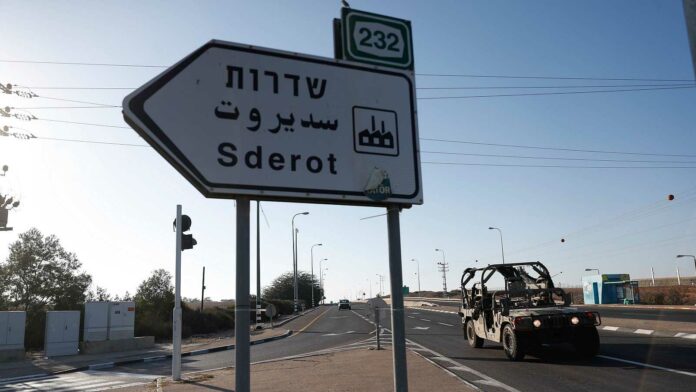In the aftermath of the devastation, Mayor Alon Davidi looks to the future of his shattered city.
Vehicles can tell a story. As we drive along the highway leading south, fewer and fewer cars are seen traveling on the road with us, although there are many heading in the opposite direction. The story they tell is one of caution and fear, of a place that is being abandoned by civilians. We soon pass a stretch of road on which many private vehicles are parked in rows under a mysterious sign with a number on it. We figured out that it’s a gathering place for reservists waiting to be picked up and taken to their base.
We continue our drive, almost alone on the road, but eventually, we find ourselves integrated into the traffic of heavy military vehicles. We see tank transporters, armored personnel carriers, and a huge monster that occupies almost all of the lanes with a D-9 bulldozer on it. These vehicles don’t need much interpretation. We pass the city of Ashkelon on our way to Sderot. Aside from being dubbed the “capital of the Gaza envelope” it has another dubious distinction, that of being the “Qassam capital of the world.” Sderot has probably absorbed more Qassam missiles than any other city during the past decade.
We pass numerous checkpoints along the way. Almost every junction is staffed by military or police forces. You can’t go in either direction without being questioned. Israeli flags fly in front of the entrance to Sderot. The city comes as a surprise to those who have never visited it before. It is a modern metropolis with new buildings and even high-rises that have somehow managed to sprout despite the difficulties the city has experienced in recent years. The streets are empty, and only soldiers and emergency personnel can be seen walking around. Cars are occasionally spotted between the buildings, most of them local police or border police vehicles.
Suddenly we hear a “code red” being called and stop the car. We are grateful that we are already inside the city, where every few meters there is a shelter designed precisely for this purpose. We have a choice between one shelter bearing a painting of a lion and another across the street decorated with the portrait of a child. We choose the roaring lion and wait inside its walls with a few other civilians. One of them is Shlomo, a municipal employee who is equipped with a helmet and bulletproof vest. In the background, there is the constant sound of thunder. “Don’t worry,” the experienced Shlomo assures us. “Those are our bombs that are falling in Gaza.” Not a minute later there are a few short rounds of thunder and a mighty explosion that makes the ground shake. “That was actually very close,” he says. “I think there were three hits. Two in the south of the city and one much closer. It sounded like it exploded near the children’s playground.”
After a few more minutes of waiting, the sirens sound the all-clear signal, and we exit the shelter. Outside, we follow Shlomo. He was remarkably accurate. There were three hits, one of them quite near us, but fortunately no casualties. As we turn onto a nearby street, next to a traffic circle and in front of a park with children’s play equipment, a crooked pipe is stuck in the sidewalk. Right next to it is a parked vehicle whose doors are wide open, its glass shattered and perforated with shrapnel. The pungent smell of gunpowder wafts through the air and an ambulance is already on the scene. The paramedics are examining the car and its surroundings. There is no one inside it. The driver had been able to exit his vehicle and shelter in a nearby building. He survived. Just seeing that car gives you an idea of what a Qassam rocket can do.
The police soon arrive to examine the site, followed by none other than the mayor of Sderot himself, Alon Davidi, accompanied by some aides. He is wearing a bulletproof vest that says “Mayor.” He is talking to several residents who have gathered at the scene, and when he sees Shlomo, he gives him a big hug. The two heave a sigh of relief at the miracle. The military personnel have already been called to remove the remains of the missile, and a tow truck arrives to evacuate the burned-out vehicle. Shlomo asks one of the remaining paramedics to take the car’s owner to the hospital, but the man refuses. “I’m fine,” he insists, but eventually Shlomo convinces him to go “just to make sure.”
To read more, subscribe to Ami





















